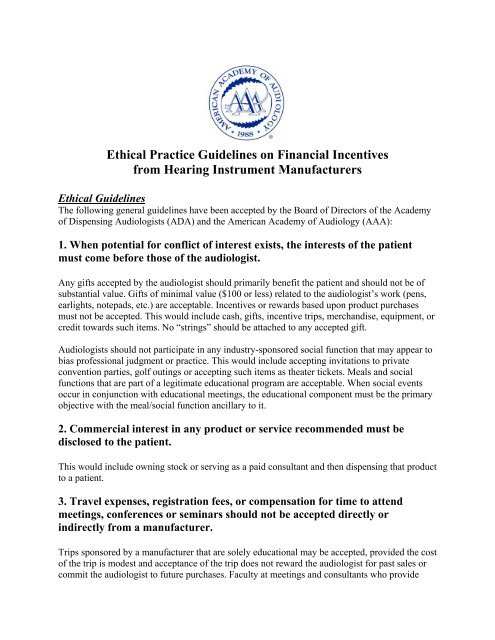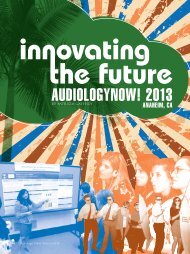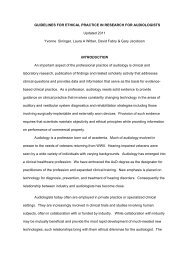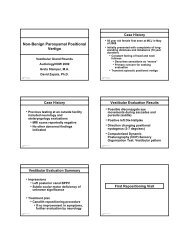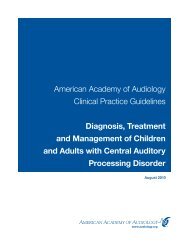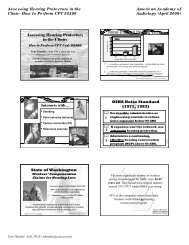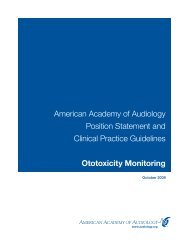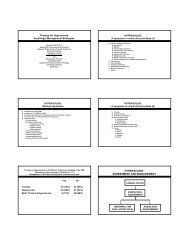Ethical Practice Guidelines on Financial Incentives from Hearing ...
Ethical Practice Guidelines on Financial Incentives from Hearing ...
Ethical Practice Guidelines on Financial Incentives from Hearing ...
Create successful ePaper yourself
Turn your PDF publications into a flip-book with our unique Google optimized e-Paper software.
<str<strong>on</strong>g>Ethical</str<strong>on</strong>g> <str<strong>on</strong>g>Practice</str<strong>on</strong>g> <str<strong>on</strong>g>Guidelines</str<strong>on</strong>g> <strong>on</strong> <strong>Financial</strong> <strong>Incentives</strong><br />
<strong>from</strong> <strong>Hearing</strong> Instrument Manufacturers<br />
<str<strong>on</strong>g>Ethical</str<strong>on</strong>g> <str<strong>on</strong>g>Guidelines</str<strong>on</strong>g><br />
The following general guidelines have been accepted by the Board of Directors of the Academy<br />
of Dispensing Audiologists (ADA) and the American Academy of Audiology (AAA):<br />
1. When potential for c<strong>on</strong>flict of interest exists, the interests of the patient<br />
must come before those of the audiologist.<br />
Any gifts accepted by the audiologist should primarily benefit the patient and should not be of<br />
substantial value. Gifts of minimal value ($100 or less) related to the audiologist’s work (pens,<br />
earlights, notepads, etc.) are acceptable. <strong>Incentives</strong> or rewards based up<strong>on</strong> product purchases<br />
must not be accepted. This would include cash, gifts, incentive trips, merchandise, equipment, or<br />
credit towards such items. No “strings” should be attached to any accepted gift.<br />
Audiologists should not participate in any industry-sp<strong>on</strong>sored social functi<strong>on</strong> that may appear to<br />
bias professi<strong>on</strong>al judgment or practice. This would include accepting invitati<strong>on</strong>s to private<br />
c<strong>on</strong>venti<strong>on</strong> parties, golf outings or accepting such items as theater tickets. Meals and social<br />
functi<strong>on</strong>s that are part of a legitimate educati<strong>on</strong>al program are acceptable. When social events<br />
occur in c<strong>on</strong>juncti<strong>on</strong> with educati<strong>on</strong>al meetings, the educati<strong>on</strong>al comp<strong>on</strong>ent must be the primary<br />
objective with the meal/social functi<strong>on</strong> ancillary to it.<br />
2. Commercial interest in any product or service recommended must be<br />
disclosed to the patient.<br />
This would include owning stock or serving as a paid c<strong>on</strong>sultant and then dispensing that product<br />
to a patient.<br />
3. Travel expenses, registrati<strong>on</strong> fees, or compensati<strong>on</strong> for time to attend<br />
meetings, c<strong>on</strong>ferences or seminars should not be accepted directly or<br />
indirectly <strong>from</strong> a manufacturer.<br />
Trips sp<strong>on</strong>sored by a manufacturer that are solely educati<strong>on</strong>al may be accepted, provided the cost<br />
of the trip is modest and acceptance of the trip does not reward the audiologist for past sales or<br />
commit the audiologist to future purchases. Faculty at meetings and c<strong>on</strong>sultants who provide
service may receive reas<strong>on</strong>able compensati<strong>on</strong> h<strong>on</strong>oraria, and reimbursement of travel, lodging<br />
and meal expenses.<br />
4. Free equipment or discounts for equipment, instituti<strong>on</strong>al support, or any<br />
form of remunerati<strong>on</strong> <strong>from</strong> a vendor for research purposes should be fully<br />
disclosed and the results of research must be accurately reported.<br />
All materials, presentati<strong>on</strong>s, or articles produced as a result of the investigati<strong>on</strong> should also carry<br />
a disclosure of the funding source. Investigators should structure research agreements with<br />
industry to insure that the results are represented accurately, and presentati<strong>on</strong> of findings is<br />
objective.<br />
Frequently Asked Questi<strong>on</strong>s (FAQs)<br />
Q. Why are AAA and ADA reviewing gift giving <strong>from</strong> manufacturers?<br />
A. Gift giving <strong>from</strong> the hearing health care industry to audiologists has been a customary<br />
practice. Gifts serve two functi<strong>on</strong>s. First, they remind audiologists of the name of the product<br />
made by that company. Sec<strong>on</strong>d, they help a company establish a relati<strong>on</strong>ship with the<br />
audiologist. However, if the decisi<strong>on</strong>s made by the professi<strong>on</strong>al are, or appear to be, influenced<br />
by an incentive or reward, or can be viewed as not being made objectively, then a c<strong>on</strong>flict of<br />
interest may be present. The professi<strong>on</strong>al’s belief that he or she is not pers<strong>on</strong>ally influenced is<br />
not sufficient to avoid the appearance of a c<strong>on</strong>flict of interest. Our organizati<strong>on</strong>s encourage<br />
manufacturer/audiologist interacti<strong>on</strong>s that serve to improve patient care. However, it is important<br />
that gifts do not have the potential to impact professi<strong>on</strong>al judgment.<br />
Q. Why would audiologists want to adhere to these guidelines?<br />
A. Audiologists must be committed to the principles of h<strong>on</strong>esty, integrity, and fairness. The<br />
principle of putting patients’ interests first is the basis of all healthcare professi<strong>on</strong>s. Adhering to<br />
these guidelines reflects positively <strong>on</strong> our professi<strong>on</strong>. All healthcare professi<strong>on</strong> licensure acts set<br />
limits <strong>on</strong> professi<strong>on</strong>al behavior. In return for a license, professi<strong>on</strong>als are obliged to adhere to<br />
certain standards of c<strong>on</strong>duct and have the obligati<strong>on</strong> to self-regulate. Additi<strong>on</strong>ally, adhering to a<br />
uniform code of ethical c<strong>on</strong>duct may prevent the audiologist <strong>from</strong> unintenti<strong>on</strong>ally violating<br />
federal and state regulati<strong>on</strong>s.<br />
Q. If an audiologist accepts gifts, what are the potential legal c<strong>on</strong>sequences?<br />
A. Acceptance of gifts may not <strong>on</strong>ly be c<strong>on</strong>strued as c<strong>on</strong>stituting a c<strong>on</strong>flict of interest; it may<br />
also be illegal. Federal laws make it a criminal act for an audiologist who provides services to<br />
Medicare, TRICARE, Medicaid and VA patients to solicit or receive “any remunerati<strong>on</strong><br />
(including any…rebate) directly or indirectly, overtly or covertly, in case or in kind…in return<br />
for purchasing…or ordering any goods or services…” Medicare already indirectly covers
hearing aids through some private Medicare HMO plans. The Office of the Inspector General has<br />
recently issued guidelines for gift-giving activities for the pharmaceutical industry and<br />
physicians that appear directly analogous to the issues covered for audiologists in this guideline.<br />
Q. Are incentive trips, vacati<strong>on</strong> packages, gift certificates, cruises, and credits<br />
toward equipment purchases or cash received <strong>from</strong> manufacturers allowed?<br />
A. No. The acceptance of such gifts, whether related to previous purchases or future purchases,<br />
raises the questi<strong>on</strong> of whether the audiologist is, in fact, holding the patient’s interests<br />
paramount. There can be no link between dispensing or referral patterns and gifts.<br />
Q. What is the difference between acceptance of trips, lease arrangements,<br />
gifts, or receiving a larger discount level?<br />
A. Establishing any type of savings plan with a specific manufacturer creates the appearance of a<br />
c<strong>on</strong>flict of interest. Discount programs, however, are generally protected by the law if they have<br />
the potential for benefiting c<strong>on</strong>sumers. Discount programs are c<strong>on</strong>sidered to present ethical<br />
issues <strong>on</strong>ly if they involve commitments by the audiologist that compromise professi<strong>on</strong>al<br />
judgment.<br />
Q. Can an audiologist accept a trip to a manufacturing facility for the purpose<br />
of training?<br />
A. Obviously, there are times when it is more ec<strong>on</strong>omical and/or a better educati<strong>on</strong>al experience<br />
can be provided when audiologists are trained together regi<strong>on</strong>ally or at the manufacturer’s<br />
facility. While it is preferable that audiologists pay their own travel expenses, there are<br />
circumstances where it is appropriate to accept tickets and/or hotel accommodati<strong>on</strong>s:<br />
• The travel expenses should <strong>on</strong>ly be those strictly necessary.<br />
• The c<strong>on</strong>ference or training must be the reas<strong>on</strong> for the trip.<br />
• Participati<strong>on</strong> must not be tied to any commitment to manufacturers.<br />
• The expense for a spouse or other travel compani<strong>on</strong> may not be compensated by the<br />
manufacturer.<br />
Q. Can an audiologist accept a lunch/dinner invitati<strong>on</strong> <strong>from</strong><br />
manufacturer’s representative in order to learn about a new product?<br />
A. Yes, modest business related meals are acceptable.<br />
Q. What are the ethical c<strong>on</strong>siderati<strong>on</strong>s regarding attendance at sp<strong>on</strong>sored<br />
social events at c<strong>on</strong>venti<strong>on</strong>s or training seminars?<br />
A. The following criteria should be c<strong>on</strong>sidered before attending such events:<br />
• The sp<strong>on</strong>sorship of the event should be disclosed to, and open to, all registrants.
• The event should facilitate discussi<strong>on</strong> am<strong>on</strong>g attendees.<br />
• The educati<strong>on</strong>al comp<strong>on</strong>ent of the c<strong>on</strong>ference should account for a substantial amount of the<br />
total time spent at the c<strong>on</strong>venti<strong>on</strong>.<br />
Q. May an audiologist or a corporati<strong>on</strong> obtain a loan <strong>from</strong> a manufacturer in<br />
order to purchase equipment and then repay a porti<strong>on</strong> of the loan with every<br />
hearing aid purchased?<br />
A. Audiologists are encouraged to obtain financing through recognized lending instituti<strong>on</strong>s or the<br />
equipment manufacturer to avoid potential c<strong>on</strong>flict of interest. Repayment should include <strong>on</strong>ly<br />
repayment of the debt plus appropriate interest fees but with no additi<strong>on</strong>al c<strong>on</strong>siderati<strong>on</strong>s or<br />
obligati<strong>on</strong>s <strong>on</strong> the part of either party.<br />
Q. May an audiologist “co-op” advertising costs with a manufacturer?<br />
A. If the manufacturer wishes to share the cost of an advertisement that features both the<br />
manufacturer’s name and the audiologist’s name, this is acceptable as l<strong>on</strong>g as there are no strings<br />
attached.<br />
Q. Is it acceptable for a manufacturer's representative to assist in seeing<br />
patients at an 'open house' at the audiologists' clinical facility?<br />
A. Open houses are usually product or manufacturer specific with a manufacturer’s<br />
representative in attendance. The c<strong>on</strong>sumer should be very much aware that the presentati<strong>on</strong><br />
would be focused <strong>on</strong> the purchase of hearing instruments <strong>from</strong> the featured manufacturer.<br />
However, the audiologist still has the resp<strong>on</strong>sibility to utilize the most appropriate instruments.<br />
The audiologist should c<strong>on</strong>sider the legal and ethical ramificati<strong>on</strong>s involved if a n<strong>on</strong>-audiologist<br />
participates in the open house.<br />
Q. Is there a potential c<strong>on</strong>flict of interest if an audiologist joins a network or<br />
buying group?<br />
A. Businesses and organizati<strong>on</strong>s are free to negotiate prices <strong>on</strong> products either directly with the<br />
manufacturer or by using the purchasing power of a buying group.<br />
Q. If an audiologist is hired by a corporati<strong>on</strong> that provides hearing aids or other related<br />
devices and is offered stock opti<strong>on</strong>s, is there a cause for c<strong>on</strong>cern regarding c<strong>on</strong>flict of<br />
interest?<br />
A. If the stock is in the corporati<strong>on</strong> the audiologist works for, there is no c<strong>on</strong>flict of interest.<br />
Q: Are there c<strong>on</strong>flicts of interest implicati<strong>on</strong>s for researchers?
A: One of the researcher's resp<strong>on</strong>sibilities is to fully disclose the funding of the research,<br />
whether it is in the form of direct grants, equipment grants or other forms of compensati<strong>on</strong> such<br />
as a c<strong>on</strong>sultantship with a sp<strong>on</strong>sor. This allows the c<strong>on</strong>sumer of the research to evaluate the<br />
potential for c<strong>on</strong>flicts of interest. Additi<strong>on</strong>ally, researchers are ethically resp<strong>on</strong>sible for ensuring<br />
the rigor of the scientific design of the experiment and the accuracy and integrity of the<br />
interpretati<strong>on</strong>.<br />
Q. Will a similar document <strong>on</strong> ethical practice guidelines be written for<br />
audiologists involved in research and academia?<br />
A. Yes. A set of guidelines is in development to address c<strong>on</strong>flicts of interest in research.<br />
Q. How will the ethical guidelines be enforced?<br />
A. Given the increased enforcement of anti-kickback, fraud, and abuse laws, audiologists should<br />
stay abreast of changes in regulatory landscape, and establish procedures and protocols that will<br />
protect them in their employment settings and practices. These guidelines are not meant to<br />
address all possible interacti<strong>on</strong>s but are an effort to assist the audiologist in cases of ethical<br />
dilemmas. At this point, educati<strong>on</strong> of our members is our focus. However, any professi<strong>on</strong> that<br />
fails to m<strong>on</strong>itor misc<strong>on</strong>duct and enforce its Code of Ethics invites the loss of aut<strong>on</strong>omy and the<br />
loss of trust in the professi<strong>on</strong>. When such activities exist, the professi<strong>on</strong> must have appropriate<br />
disciplinary procedures in place.


